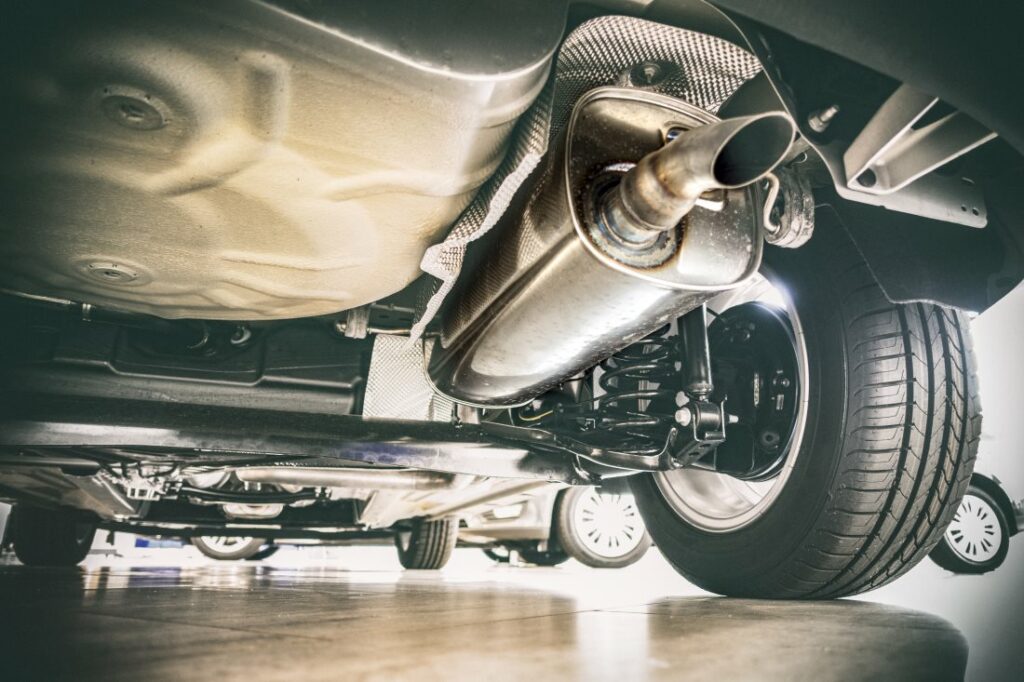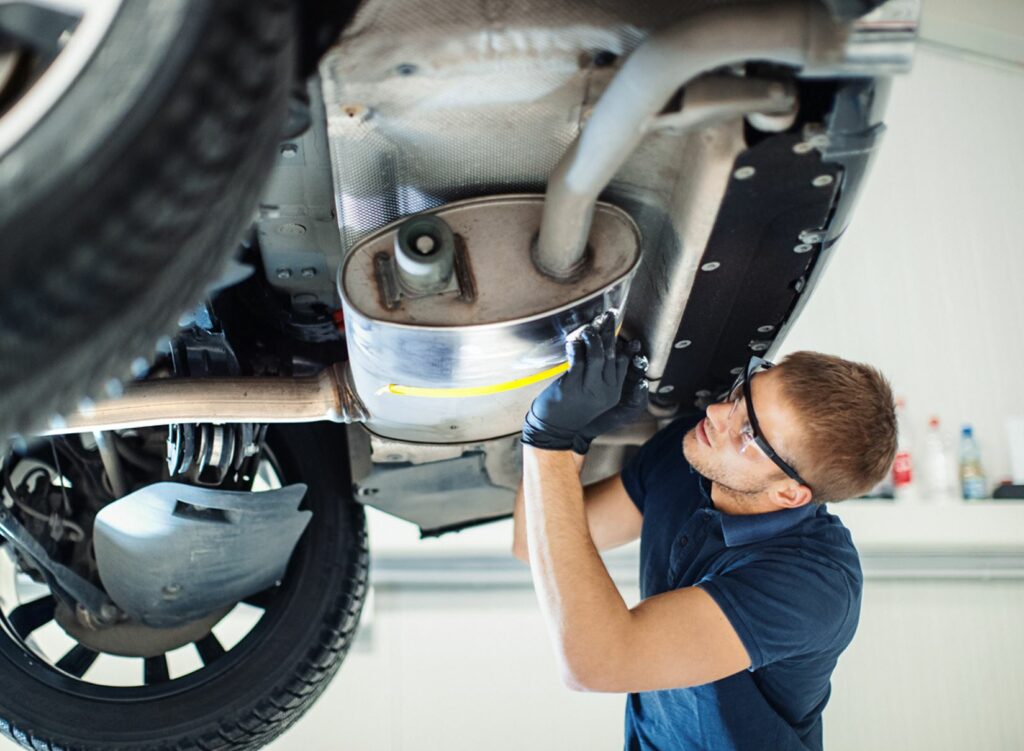
Check Your Vehicle’s Exhaust System Often: A Comprehensive Guide
As responsible car owners, we often focus on engine performance, fuel efficiency, and regular maintenance checks. However, there’s one crucial aspect that can be easily overlooked—check your vehicle’s exhaust system often. In this article, we will explore the importance of regularly checking your vehicle’s exhaust system and how it contributes to a safer and smoother driving experience. So fasten your seat belts as we dive into the world of exhaust systems!
Understanding the Exhaust System

The exhaust system is a complex network of components that work together to remove harmful gases from the engine and reduce noise. It includes pipes, catalytic converters, mufflers, and more. Understanding these components is vital for identifying potential issues.
The Significance of Regular Checks
So, here’s the scoop: regularly check your vehicle’s exhaust system often comes with some serious perks:
- Keeping Your Ride in Top Shape: As time goes by, wear and tear can sneak up on your exhaust system. Think leaks, rust, or damage from the road’s little surprises. But when you spot these issues early and give ’em some TLC, you’re not only preventing further damage but also keeping your car’s performance in the sweet spot. And that means fewer expensive repairs in the long run – cha-ching!
- A Breath of Fresh Air: Your exhaust system does more than just make your engine whisper instead of roar; it’s a superhero in minimizing harmful emissions. That trusty catalytic converter does wonders by reducing nasty gases like carbon monoxide, nitrogen oxides, and hydrocarbons. Regular checks make sure this hero is on the job, keeping emissions at levels that don’t make you or Mother Earth cringe.
- No Nasty Surprises: Faulty exhaust systems can let carbon monoxide (CO) sneak into your ride. Now, here’s the scary part – CO is a silent, sneaky gas that’s both odorless and colorless. Inhaling it in large amounts can be downright deadly. But with regular inspections, you’re like a detective sniffing out leaks or cracks in your exhaust system, keeping CO at bay and making sure you’re safe and sound.
- Saving Some Bucks at the Pump: A well-loved exhaust system is a bit of a fuel efficiency ninja. It’s got these little helpers like the oxygen sensor and catalytic converter, and they’re all about balancing the air-fuel mix and making sure your engine runs like a champ. When your exhaust system falters, it messes up this dance, and you end up burning more fuel. Regular checks make sure these heroes are doing their job, which means you’re saving money every time you hit the gas pump.
- So, there you have it, folks – regular exhaust system inspections aren’t just a chore; they’re your secret weapon for a healthy car, cleaner air, safety, and a happier wallet
Signs of Exhaust System Issues
Wondering if your exhaust system needs some love? Keep an eye out for these telltale signs:
- Unusual Noises: If your ride starts sounding like it’s auditioning for a noisy concert – think roaring or hissing – there might be a leak or a grumpy muffler. Rattling sounds? That’s a clue that something’s loose or broken in your exhaust system.
- Foul Odors: Strong odors inside your cabin, like the smell of sulfur, something burning, or exhaust fumes, could be a hint that your exhaust system isn’t having the best day. It might be due to leaks or a catalytic converter that’s taken a wrong turn.
- Reduced Performance: Feeling a bit of a slump in your car’s mojo? Reduced power, slower acceleration, or just overall meh performance could mean your catalytic converter’s feeling clogged or your exhaust pipe is playing hide and seek. Sorting these issues out quickly will keep your ride in tip-top form.
- Visible Smoke or Vapor: When your tailpipe becomes a smoke machine, it’s a sign that something’s amiss – either with your engine or your exhaust system. Different colors of smoke, like white, black, or blue, might tell you a specific story. White is coolant trouble, black means burning oil, and blue suggests a rich fuel mix. These smoke signals are your car’s way of saying, “Help!”
- So, keep an eye (and nose) out for these signs, and you’ll know when it’s time to give your exhaust system some attention.
Professional Inspection and Maintenance
Doing DIY inspections is a great start, but there’s no substitute for professional inspections when you want the full picture:
- Find a Trusted Mechanic: The real deal is to locate a mechanic with a rock-solid reputation. Look for someone who’s an exhaust system whiz, well-versed in the nitty-gritty. They should be loaded up with the expertise and equipment needed for a deep dive into inspections and repairs.
- Stick to a Maintenance Schedule: Keep things on the up-and-up by following your vehicle manufacturer’s recommended maintenance schedule for the exhaust system. Regular inspections should be part of your maintenance routine.
- Repairs and Replacements: If your pro spots any issues during the inspection, it’s time for a chat. Components like mufflers, catalytic converters, or exhaust pipes may need swapping out if they’re battered or on their last legs. Trust your mechanic’s judgment for the best course of action.
- In a nutshell, DIY checks are cool, but when you want the full enchilada, a professional inspection is the way to go. It’s all about peace of mind and keeping your ride in top form.
Importance of Professional Inspection and Maintenance

While check your vehicle’s exhaust system often on your own is a good start, don’t underestimate the power of professional inspections and maintenance. Here’s why they’re a big deal:
Expertise and Specialized Equipment: Reputable mechanics who specialize in exhaust systems are like the Sherlock Holmes of your car. They’ve got the smarts, experience, and high-tech gear to dig deep and find even the sneakiest issues that you might miss in a DIY check.
Manufacturer’s Maintenance Schedule: Following the manufacturer’s recommended maintenance schedule isn’t just a suggestion; it’s a roadmap to keeping your exhaust system in top shape. Regular inspections and timely fixes, if necessary, are key to making sure your exhaust system runs like a well-oiled machine.
Investment in Longevity and Reliability: Relying on pros for exhaust system maintenance isn’t a splurge; it’s an investment. It pays off by ensuring your exhaust system performs efficiently, reduces emissions, and keeps your drive safe. It’s all about a ride that goes the distance and doesn’t leave you hanging.
So, remember, trusting the professionals for your exhaust system is like giving your car the VIP treatment it deserves. It’s all about a ride that’s in it for the long haul and doesn’t skimp on reliability.
Security Device For Vehicles
Signal extenders, which are instruments used in relay assaults, are targeted by this creative and user-friendly chip. Simply install the chip to start taking advantage of all the wonderful advantages it provides. How does it function? After 3 minutes of inactivity, it deactivates fobs. A 3D motion sensor, LED indication, microprocessor, and flexible base make up this device.
Since there is a greater risk that you may experience keyless theft, you do not need to deactivate a key fob that has been taken. Instead, you must make sure the transponder is adequately protected.
Conclusion
Regularly checking your vehicle’s exhaust system is crucial for maintaining optimal performance, protecting your health and the environment, preventing carbon monoxide poisoning, and enhancing fuel efficiency. By staying vigilant and addressing issues promptly, you can enjoy a safer, more efficient, and smoother driving experience. Remember, your vehicle’s exhaust system deserves the same attention and care as other critical components. So, make it a habit to check your vehicle’s exhaust system often and reap the benefits of a well-maintained ride.




